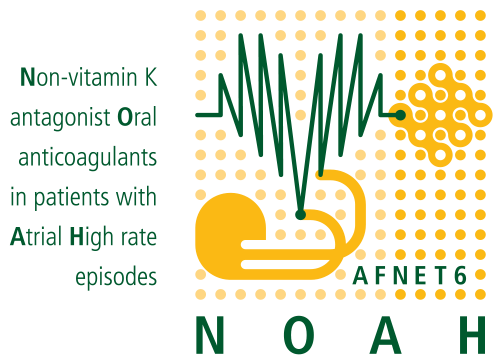Update 19/05/2024 (subanalysis)
In patients with device-detected atrial fibrillation and a previous stroke, oral anticoagulation leads to more bleeding without a significant reduction in the incidence of stroke. This is the result of a sub-analysis of the NOAH AFNET 6 trial.
It was presented on 19 May 2020 at the annual congress of the American Heart Rhythm Society (HRS) in Boston, USA. To the press release of the Atrial Fibrillation NETwork (AFNET)
Update 09/04/2024 (subanalysis)
In patients with device-detected atrial fibrillation and several concomitant diseases, oral anticoagulation leads to more bleeding without a significant reduction in the frequency of strokes. This is the result of a sub-analysis of the NOAH AFNET 6 trial.
It was presented on 9 April 2020 at the annual congress of the European Heart Rhythm Association (EHRA) in Berlin and published simultaneously in the European Heart Journal. To the press release of the Atrial Fibrillation NETwork(AFNET).
Device-detected atrial fibrillation, also called sub-clinical atrial fibrillation (SCAF) or atrial high-rate episodes (AHRE), are short and rare atrial arrhythmias detected by implanted pacemakers, defibrillators, and loop recorders that enable long-term monitoring of heart rhythm. The episodes resemble atrial fibrillation. Device-detected atrial fibrillation is found in every fifth patient with a pacemaker or another cardiac implanted electronic device. Device-detected atrial fibrillation can lead to stroke, but the stroke risk in patients with device-detected atrial fibrillation appears lower than the stroke risk in patients with ECG-documented atrial fibrillation. Observational data suggested that patients with very long episodes of device-detected atrial fibrillation may have a higher stroke risk.
Recently, the NOAH – AFNET 6 (Non vitamin K antagonist Oral anticoagulants in patients with Atrial High-rate episodes) trial found that anticoagulation increases bleeding events in patients with device-detected atrial fibrillation while the effect on stroke was smaller than expected.
Dr Becher and the NOAH – AFNET 6 team evaluated the efficacy and safety of anticoagulation with edoxaban in patients with long episodes of device-detected atrial fibrillation lasting 24 hours or more in the NOAH – AFNET 6 trial (1). The findings are consistent with the main trial: Anticoagulation had only has a minor effect on stroke and systemic embolism. An additional analysis including AHRE duration as a continuous variable confirmed that episode duration did not interact with the effect of anticoagulation. The low stroke rate without anticoagulation came as a surprise compared to older analyses. The results will need confirmation in larger and independent data sets.
Dr Becher states: “The effects of anticoagulation in patients with device-detected atrial fibrillation appear consistent across episode durations, including in patients with very long episodes. This highlights the need to involve all patients with device-detected AF in a balanced decision-making process on anticoagulation that considers the effects on stroke and bleeding.”
NOAH – AFNET 6 compared the anticoagulant edoxaban to placebo. A similar trial called ARTESiA (Apixaban for the Reduction of Thrombo-Embolism in Patients with Device-Detected Sub-Clinical Atrial Fibrillation) trial tested the efficacy and safety of another anticoagulant, apixaban, in patients with device-detected atrial fibrillation. A trial-level meta-analysis of these two first-in-kind randomized trials of anticoagulation in patients with device-detected atrial fibrillation shows consistent results in both trials: Anticoagulation prevents on average three strokes and induces seven major bleeding events per 1000 patient-years of treatment.
Professor Andreas Goette, St. Vincenz Hospital, Paderborn, Germany, who was involved in the NOAH – AFNET 6 trial and in the meta-analysis observes: “On average, anticoagulation reduces stroke by a small absolute amount. This desirable effect comes at the price of an increase in major bleeding events. Clinicians need to consider these effects when taking individual decisions on anticoagulation in patients with device-detected atrial fibrillation.”
Professor Paulus Kirchhof, UKE, lead investigator of the NOAH – AFNET 6 trial and DZHK scientist, states: “We now have much better estimates of the efficacy and safety of oral anticoagulation in patients with device-detected atrial fibrillation. We clearly need additional methods to identify patients with device-detected atrial fibrillation at high risk of stroke.”
More information on the study, related publications and press releases can be found here: NOAH-AFNET 6
Original publication: Becher N, Toennis T, Bertaglia E, et al. Anticoagulation with edoxaban in patients with long Atrial High-Rate Episodes ≥24 hours. Eur H J 2023; in press. DOI: 10.1093/eurheartj/ehad771
Scientific contact: Prof. Paulus Kirchhof (ju.ebeling(at)uke.de), clinical director, UKE Hamburg
Source: idw press release



